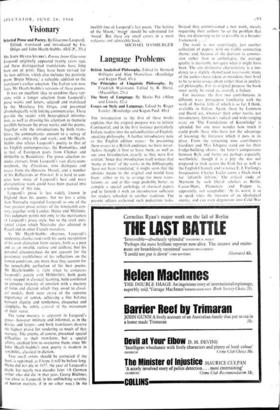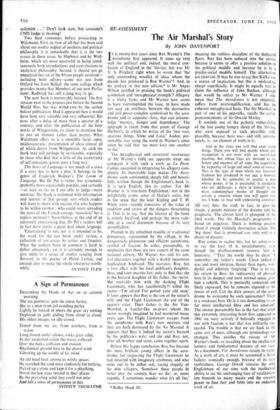Language Problems
The Principles of Linguistic Philosophy. By Friedrich Waismann. Edited by R. Harre. (Macmillan, 25s.)
Essays on Style and Language. Edited by Roger Fowler. (Routledge and Kegan Paul, 40s.) THE introduction to the first of these books explains that the original purpose was to initiate Continental, and in the first instance particularly Italian, readers into the unfamiliarities of English- speaking philosophy. A further introductory note to this English edition states: 'In presenting these essays to a British audience, we have never- theless thought it best to leave them, as well as our own Introduction, exactly as they were first written.' Since that introduction itself notices that 'many or most' of the works in the bibliography 'have not be.m translated,' it might seem that the obvious means to the original end would have been : either to try to arrange for more trans- lations; or. and at this stage probably better, to compile a special anthology of classical papers and to furnish it with an introduction sufficient for readers schooled in another tradition. The present editors eschewed such pedestrian tasks.
Instead they commissioned a new work, merely requesting their authors 'to set the problem that they are discussing so far as possible in a broader framework . .
The result is. not surprisingly, just another collection of papers. with no visible connecting theme; and, because of the decision to commis- sion rather than to anthologise, the average quality is inevitably not quite what it might have been. The one distinctive characteristic is a ten- dancy to a slightly shamefaced narcissism; many of the authors have taken, or mistaken, their brief to be to write essays about rather than in analyti- cal philosophy. For its original purpose the book must surely be rated as, overall, a failure.
For instance, the first two contributions in different ways presuppose familiarity with the work of Austin, little of which is so far, 1 think, available in Italian. Again, those by Lemmon and Harre are, whatever their other merits, not introductory. Quinton's radical and wide-ranging essay on 'The Foundations of Knowledge' is splendid, but one must wonder how much it could profit those who have not the advantage of knowing the literature which it puts in its place. From the remaining nine contributors Gardiner and M iss Ishiguro stand out for their bridge-building efforts: the latter's comparisons between Ryle and Sartre are perhaps especially worthwhile; though it is a pity she was not prepared to look across the Irish Sea as well as the English Channel, and to notice E. J. Furlong's Imagination. Charles Taylor earns a black mark for 'infantile leftism.' The critical study of Marxism by such liberal scholars as Berlin, Carew-Hunt. Plamenatz and Popper is, apparently, not acceptable: 'At its worst, it so to speak takes the measure of an ideological enemy, and can even degenerate into Cold War essays in these areas, by Hepburn and by Woll- helm, which are most successful in being simul- taneously both introductions and contributions to analytical philosophy. Second, it should not go unnoticed that six of the fifteen people involved— including both editors—come not just from Oxford but from Balliol; the same college which provides twenty-five Members of our new Parlia- ment. Redbrick has still a long way to go.
The next book is memorably belated. The first version went to the printers just before the Second World War, but was withdrawn •by the author before publication. Had it appeared then it would have been very valuable and very influential. But now, after a delay of more than a quarter of a century, and after the publication of the later works of Wittgenstein, its claim to attention has to rest on manner rather than matter. What Waismann offers us is a smoothly lucid, open, Vnidiosyncratic, presentation of ideas almost all of which derive from Wittgenstein. As such the hook may still perhaps be serviceable, especially to those who find that a little of the eccentricity of self-conscious genius goes a long way.
The Story of Language is not much of a story if a story has to have a plot. It belongs to the genre of Frederick Bodmer's The Loom of Language. But Dr Pei is rather less systematic, probably more successfully popular, and certainly at least as far as I am able to judge--more accurate. His book is crammed with information and interest of that gossipy sort which readers Will want to share with anyone else who happens to be within earshot: who could resist spreading the news of the French coinage `monokini' for a topless swimsuit? Nevertheless, at the end of an extremely entertaining day, Dr Pei's readers will in fact have learnt a great deal about language.
`Entertaining' is not, nor is it intended to be, the word for the last book under review, a collection of ten essays by critics and linguists. What the authors have in common is hard to define adequately, yet it is certainly enough to give unity to a series of studies ranging from Beowulf to the poems of Philip Larkin, and enough also to make the whole enterprise worth-
CND badge is showing!
Two final comments before proceeding to Waismann. First, in view of all that has been said about our insular neglect of aesthetic and political hil h it is remarkable that it is the w p osop y s remar a e a s e o















































 Previous page
Previous page